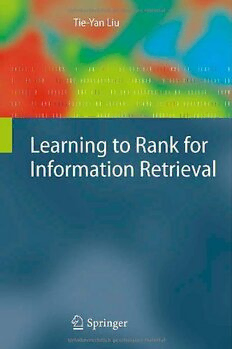Download Learning to Rank for Information Retrieval PDF Free - Full Version
Download Learning to Rank for Information Retrieval by Tie-Yan Liu (auth.) in PDF format completely FREE. No registration required, no payment needed. Get instant access to this valuable resource on PDFdrive.to!
About Learning to Rank for Information Retrieval
Due to the fast growth of the Web and the difficulties in finding desired information, efficient and effective information retrieval systems have become more important than ever, and the search engine has become an essential tool for many people.The ranker, a central component in every search engine, is responsible for the matching between processed queries and indexed documents. Because of its central role, great attention has been paid to the research and development of ranking technologies. In addition, ranking is also pivotal for many other information retrieval applications, such as collaborative filtering, definition ranking, question answering, multimedia retrieval, text summarization, and online advertisement. Leveraging machine learning technologies in the ranking process has led to innovative and more effective ranking models, and eventually to a completely new research area called “learning to rank”.Liu first gives a comprehensive review of the major approaches to learning to rank. For each approach he presents the basic framework, with example algorithms, and he discusses its advantages and disadvantages. He continues with some recent advances in learning to rank that cannot be simply categorized into the three major approaches – these include relational ranking, query-dependent ranking, transfer ranking, and semisupervised ranking. His presentation is completed by several examples that apply these technologies to solve real information retrieval problems, and by theoretical discussions on guarantees for ranking performance.This book is written for researchers and graduate students in both information retrieval and machine learning. They will find here the only comprehensive description of the state of the art in a field that has driven the recent advances in search engine development.
Detailed Information
| Author: | Tie-Yan Liu (auth.) |
|---|---|
| Publication Year: | 2011 |
| ISBN: | 9783642142666 |
| Pages: | 304 |
| Language: | English |
| File Size: | 1.993 |
| Format: | |
| Price: | FREE |
Safe & Secure Download - No registration required
Why Choose PDFdrive for Your Free Learning to Rank for Information Retrieval Download?
- 100% Free: No hidden fees or subscriptions required for one book every day.
- No Registration: Immediate access is available without creating accounts for one book every day.
- Safe and Secure: Clean downloads without malware or viruses
- Multiple Formats: PDF, MOBI, Mpub,... optimized for all devices
- Educational Resource: Supporting knowledge sharing and learning
Frequently Asked Questions
Is it really free to download Learning to Rank for Information Retrieval PDF?
Yes, on https://PDFdrive.to you can download Learning to Rank for Information Retrieval by Tie-Yan Liu (auth.) completely free. We don't require any payment, subscription, or registration to access this PDF file. For 3 books every day.
How can I read Learning to Rank for Information Retrieval on my mobile device?
After downloading Learning to Rank for Information Retrieval PDF, you can open it with any PDF reader app on your phone or tablet. We recommend using Adobe Acrobat Reader, Apple Books, or Google Play Books for the best reading experience.
Is this the full version of Learning to Rank for Information Retrieval?
Yes, this is the complete PDF version of Learning to Rank for Information Retrieval by Tie-Yan Liu (auth.). You will be able to read the entire content as in the printed version without missing any pages.
Is it legal to download Learning to Rank for Information Retrieval PDF for free?
https://PDFdrive.to provides links to free educational resources available online. We do not store any files on our servers. Please be aware of copyright laws in your country before downloading.
The materials shared are intended for research, educational, and personal use in accordance with fair use principles.

